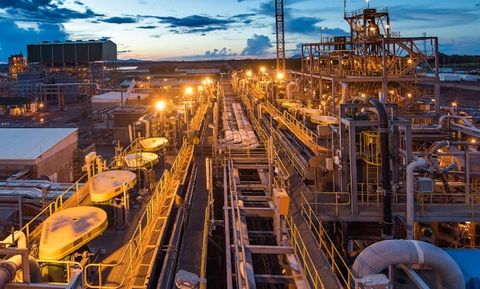Communication - Presse
Australia’s Syrah gets first tranche of US funding for graphite mine

Australian mining company Syrah announced on Monday that it has received a first tranche of $53 million (€49.5 million) in US government funding for a graphite mine it operates at Balama, in northern Mozambique, for the mine’s expansion and sustainability.
This is the first instalment of a total loan of $150 million (€140 million), with a further disbursement of 47 million dollars (43.9 million dollars) is scheduled for October 2027, the company said.
This loan was approved by the Development Finance Corporation (DFC) and is the first of its kind from the institution, the US government’s main development finance institution, for a graphite mining operation.
The company, whose activity in Mozambique is carried out by its subsidiary Twigg Mining and Exploration, in Cabo Delgado, had previously said that the investment was justified by “the importance of Balama to strengthen the US supply chain” in “critical minerals” for its industries.
“The DFC loan supports Syrah in managing volatile natural graphite market conditions in the short term and continuing operations in preparation for increased sales to anode customers,” it added.
The Australian company is also building a battery material factory in Vidalia, in the US state of Georgia, which is to be supplied with Mozambican ore, in this case with two tonnes shipped in April last year, according to previous data from Syrah.
Production in Mozambique of graphite, an ore used in electric batteries, was in the first half of this year down 40% on a year earlier, due to the paralysis and interruption of activities at two mines, according to official figures.
Budget execution figures from January to June indicated that Mozambique produced 34,899 tonnes of graphite in this period, 11% of this year’s target of 329,040 tonnes, which still compares with 58,708 tonnes in the first six months of 2023.
This sharp decrease was the result of “the paralysation of activities” at the GK Ancuabe Graphite Mine since 2023, as well as the interruption of activities at Twigg Mining and Exploration, “due to low demand for this mineral on the international market, combined with price volatility,” reads a report released at the time.
In the first half of the year, the Balama graphite mine began exporting graphite to an Indonesian battery manufacturer, which bought 10,000 tonnes, Syrah announced in April.
According to information released to the markets by Syrah, this was the “first large volume sale of natural graphite to a battery supply chain participant outside of China.
“This bulk sale follows a trial shipment of containers of natural graphite fines from Balama to Indonesia” in the first quarter of 2024, the company explained, adding that this export “is another important development” in the unit’s sales diversification strategy.
The mining company added that the BTR New Materials Group is building a $478-million (€429-million) battery factory in Indonesia – “which should start production in 2024” – and also forecast new sales from that mine for the company.
Mozambique expects this year to produce more than 329,040 tonnes of graphite, a material needed to produce batteries for electric vehicles, which would be an increase of more than 180% on the 2023 performance, according to the government’s forecast.
In the document supporting its proposed Economic and Social Plan of the State Budget for 2024, the government stated that graphite production “will increase significantly” in the country.
Mozambique produced 120,000 tonnes of graphite in 2020, but this fell to 77,116 tonnes the following year. Estimates for 2022 and 2023 output were of 182,024 and 117,416 tonnes respectively.
